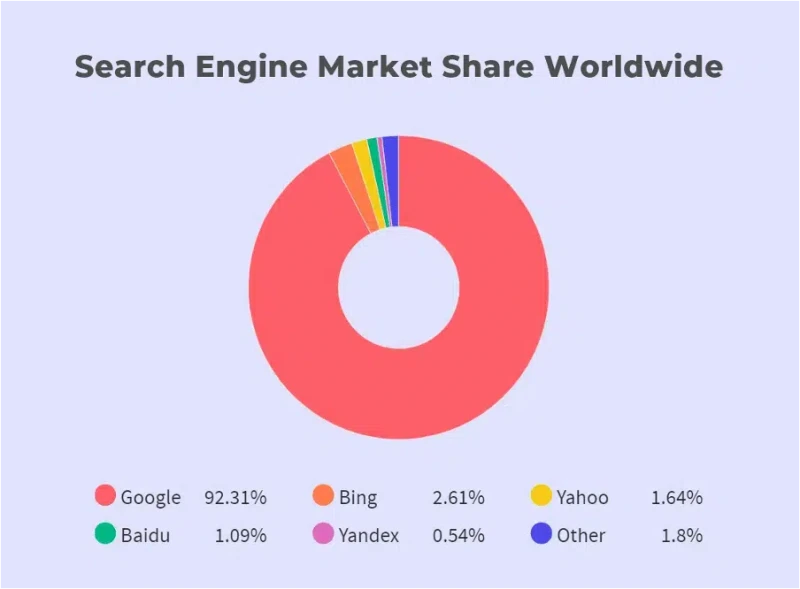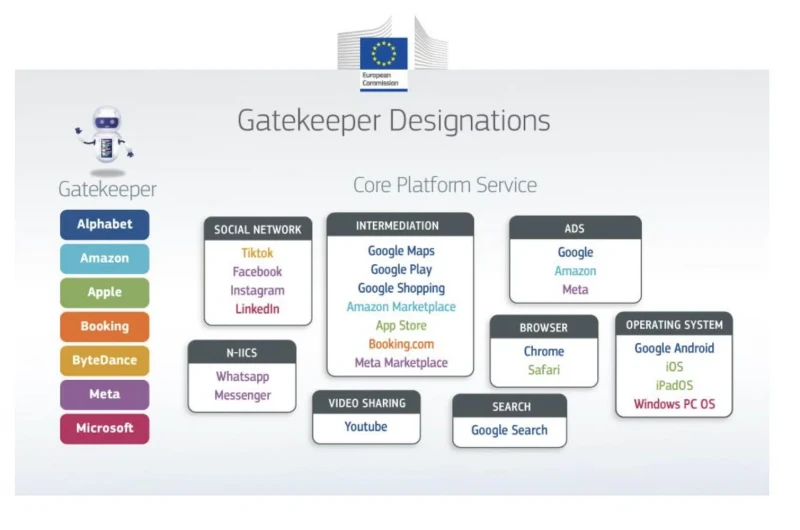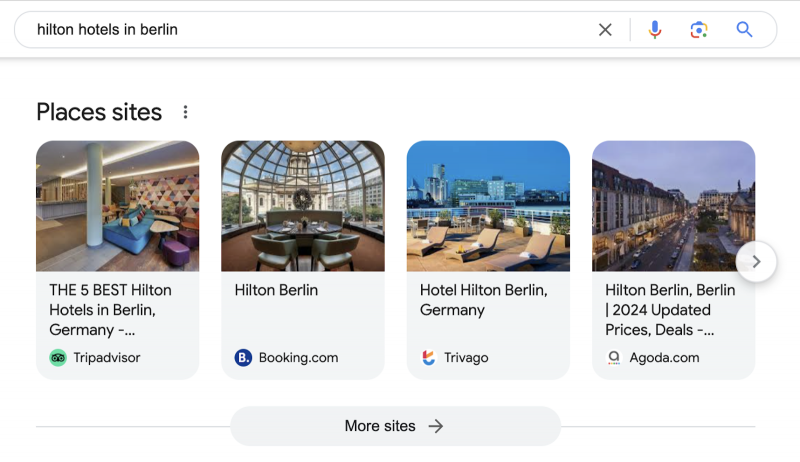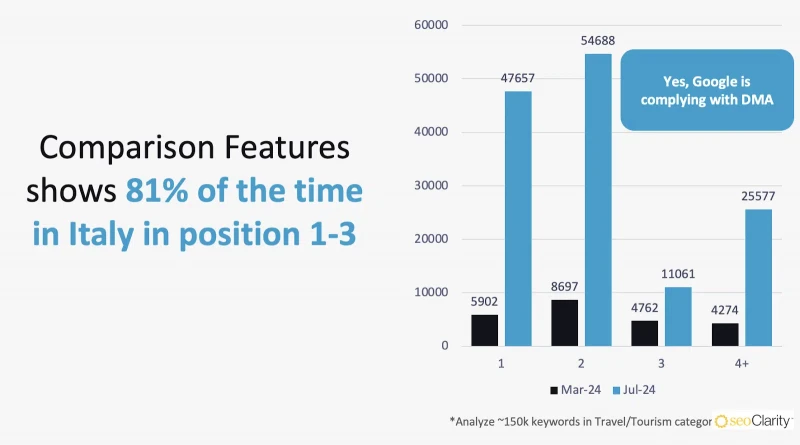How the Digital Markets Act is reshaping search and Google’s monopoly in Europe
The Digital Markets Act (DMA) was created to change the digital landscape in Europe. This new EU legislation aims to promote competition, stop monopolistic behavior and ensure that digital markets are fairer and more open.
To understand its significance, we first need to explore how Google became a dominant force in the search industry and how this dominance has impacted the market.
How Google became a search monopoly
Google’s journey to dominance began in the late 1990s.
In 1999, it was a search engine that allowed users to discover new brands easily. Its algorithms provided faster, more relevant results than other search engines of the time, and it quickly became the preferred platform for web users globally.

By the early 2000s, Google revolutionized how people and businesses accessed information. The introduction of search engine optimization (SEO) further amplified this.
Brands worldwide began investing heavily in SEO to ensure their products and services were highly ranked on Google. The growth of SEO cemented Google’s role as the central player in the search ecosystem.

However, as Google’s search platform grew, it expanded beyond providing links to third-party websites and introduced its services, such as Google Flights, Google Shopping and Google Hotels.
Initially, these products offered users greater convenience, but over time, they also allowed Google to prioritize its own services over those of its competitors.
Google achieved near-complete market control, with over 90% of global search traffic flowing through its platform by the mid-2010s. This was a staggering achievement, but it also raised serious concerns.
As Google increasingly self-preferenced its products in search results, competition was stifled.
For example, travel startups and comparison-shopping websites began to see significant declines in traffic because Google would place its own offerings at the top of search results.
According to a European Commission report, Google’s practices reduced traffic to rival comparison services by as much as 85% in the U.K., 92% in Germany and 40% in France.
This overwhelming control across multiple verticals in the digital space gave Google unparalleled power, which many critics argue came at the expense of competition, innovation and consumer choice.
The Digital Markets Act
In response to Google’s dominance, the European Union took action.
After years of legal battles and fines, the EU passed the DMA, which came into force in 2024.
The DMA aims to ensure that large online platforms, called “gatekeepers” (like Google), do not abuse their market power.

The DMA introduces several critical rules designed to restore competition and prevent monopolistic practices:
- “No preferencing” rule: This rule prevents gatekeepers from favoring their own services in search results. For instance, Google can no longer promote Google Flights or Google Hotels over competing services in the same category.
- Severe penalties for non-compliance: Companies that violate the DMA face steep fines, up to 10% of their global annual revenue, with additional penalties for repeated offenses. Given the scale of Google’s operations, this could translate into billions of dollars in fines.
The DMA also targets other practices, such as service bundling, unfair access to data and restrictions placed on app developers using the platform. It aims to level the playing field, ensuring smaller companies have a fair chance to compete in the market.
While Google has expressed willingness to comply, its operations’ sheer size and scope mean that full compliance will require a significant shift in its operations.
It also remains to be seen whether these changes will meaningfully reduce Google’s dominance or simply create new hurdles for competitors.
Dig deeper: Google unveils major changes to ensure Digital Markets Act compliance
Why does this matter for SEOs?
Since the DMA came into effect, the impact on Google’s search results is noticeable, especially in the travel sector, which was heavily dominated by Google’s services.
Significant shifts in search engine results pages (SERPs) for travel-related keywords occurred in several European countries, including Italy and Germany.
I became an investigator and partnered with seoClarity, which provided me with significant research on the changes in search results of over 1.5 million keywords in Italy and Germany.
For example, when users in Italy search for travel or hotel information, they now often see comparison features at the top of the SERP, showing results from a variety of different services rather than just Google’s own products.

Data from a study of 150,000 travel-related keywords in the Italian market showed that comparison features appear in 81% of searches in the top three positions – indicating that Google is beginning to comply with the no-preferencing rule in this sector.

Data from 1.35 million keywords in Germany suggests similar changes are visible.
For example, when users search for hotel bookings, Google Hotels, which once dominated the top position, is now more frequently ranked second or lower, with third-party comparison tools appearing in higher positions.
This represents a positive development for competitors who previously struggled to rank against Google’s own services.
However, Google’s compliance isn’t universal. In some instances, such as flight searches, Google’s services dominate the top spots, suggesting that full compliance with the DMA is still a work in progress.
Nonetheless, these initial changes clearly indicate that the DMA is starting to impact how search results are presented in Europe.
Dig deeper: Google updates data privacy policies for targeted ads in the EU
Key takeaways for SEOs and businesses
The evolving search landscape post-DMA compliance offers valuable insights for businesses and SEOs looking to optimize their strategies.
Experiment with SERP features
With the introduction of comparison features becoming more prominent in search results, SEOs should focus on optimizing for these new snippets.
This includes understanding how query shortcuts work and adjusting content to fit these new formats.
Monitor and report non-compliance
While the DMA aims to ensure fair competition, there may still be instances where Google’s search results favor its own services.
Businesses are encouraged to remain vigilant and report any non-compliance to the appropriate regulatory bodies directly to the DMA team here.
Stay agile and keep testing
The search landscape is changing rapidly. Businesses need to experiment continuously with different optimization techniques.
This includes leveraging new SERP features and adapting to evolving algorithms that prioritize comparison tools and third-party services over Google’s own offerings.